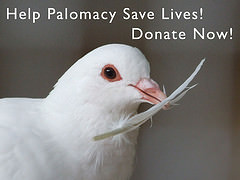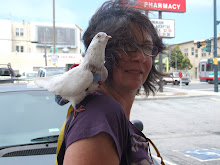King Pigeons FAQs
Q: Where do all the king pigeons come from?
A: Kings are bred for meat (squab) and sold at Live Food Markets throughout San Francisco. Some birds escape, some are set free (a kindness they usually don't survive) and a few are lost or surrendered pets.
Q: Why can't the king pigeons just be set free to live with all the other pigeons?
A: King pigeons are a domesticated breed that are usually raised in crates with no opportunity to learn flying or foraging skills. Even if they had the chance to do so, their genes work against them because they are bred to be big bodied (for maximum meat yield) making them poor fliers and bright white (consumers prefer the pink skin that accompanies white feathers) which makes them easy targets for predators.
Q: Why do you rescue pigeons?
A: I never intended to become a pigeon rescuer but, when I started volunteering at the animal shelter, I saw that while all the other animals had various rescues and nonprofits working on their behalf, the king pigeons didn't.
Q: What about the poop?
A: Pigeons are vegans that eat grains and seeds and eliminate both their urine and fecal matter at the same time in a poop that is somewhere between the consistency of mud and clay. I find it to be very inoffensive (especially when compared to my dog and cats' waste). It doesn't really smell and is easy to clean up. My pigeons live in a room with a linoleum floor and I clean up their poops twice a day with a scraper and a dustpan. Once a week, I do a thorough floor washing. They say pigeon poop makes the best compost in the world. Some pigeons wear diapers (I prefer to call them pigeon pants) and so can live with their people and never make any mess at all.
Q: What are king pigeons like as pets?
A: I'm not an expert, having been doing this less than a year, but from my experience, I'd describe kings as calm, easy-going pets. They're quiet, affectionate and friendly but not particularly demanding. They're not as energetic or excitable as wild or racing pigeons and tend to walk rather than fly where they're going. Each has a unique personality but their nature is subtle. Some would find them boring, I'm sure, but I really like how mellow they are.
Q: What kind of care do kings require?
A: Kings need pigeon feed (a dry mix of corn, peas, grains and seeds), grit, water and some greens (such as spinach or wheat grass or grated carrots) fresh daily. They need a social life, whether as a single bird living integrated with a human family or as a bonded pair or as part of a flock. Their enclosure needs to be cleaned up daily. They like to bathe and need a pan of water in which to do so. They need some fresh air and sunshine and room to move around. Kings can live either indoors or out of doors and I recommend a space about the size of a refrigerator lying on its side (approximately 3 ft high by 3 ft wide by 6 ft long) or larger for 1 to 2 birds. They're ground feeders and need horizontal rather than vertical space. They need to be protected from predators (cats, dogs, raccoons, hawks, etc. ) and extreme weather. Unlike parrots, they are not chewers and so can be kept in wooden and wire enclosures. I highly recommend Pigeon Talk as a source of info: http://www.pigeons.biz/forums
A: Kings are bred for meat (squab) and sold at Live Food Markets throughout San Francisco. Some birds escape, some are set free (a kindness they usually don't survive) and a few are lost or surrendered pets.
Q: Why can't the king pigeons just be set free to live with all the other pigeons?
A: King pigeons are a domesticated breed that are usually raised in crates with no opportunity to learn flying or foraging skills. Even if they had the chance to do so, their genes work against them because they are bred to be big bodied (for maximum meat yield) making them poor fliers and bright white (consumers prefer the pink skin that accompanies white feathers) which makes them easy targets for predators.
Q: Why do you rescue pigeons?
A: I never intended to become a pigeon rescuer but, when I started volunteering at the animal shelter, I saw that while all the other animals had various rescues and nonprofits working on their behalf, the king pigeons didn't.
Q: What about the poop?
A: Pigeons are vegans that eat grains and seeds and eliminate both their urine and fecal matter at the same time in a poop that is somewhere between the consistency of mud and clay. I find it to be very inoffensive (especially when compared to my dog and cats' waste). It doesn't really smell and is easy to clean up. My pigeons live in a room with a linoleum floor and I clean up their poops twice a day with a scraper and a dustpan. Once a week, I do a thorough floor washing. They say pigeon poop makes the best compost in the world. Some pigeons wear diapers (I prefer to call them pigeon pants) and so can live with their people and never make any mess at all.
Q: What are king pigeons like as pets?
A: I'm not an expert, having been doing this less than a year, but from my experience, I'd describe kings as calm, easy-going pets. They're quiet, affectionate and friendly but not particularly demanding. They're not as energetic or excitable as wild or racing pigeons and tend to walk rather than fly where they're going. Each has a unique personality but their nature is subtle. Some would find them boring, I'm sure, but I really like how mellow they are.
Q: What kind of care do kings require?
A: Kings need pigeon feed (a dry mix of corn, peas, grains and seeds), grit, water and some greens (such as spinach or wheat grass or grated carrots) fresh daily. They need a social life, whether as a single bird living integrated with a human family or as a bonded pair or as part of a flock. Their enclosure needs to be cleaned up daily. They like to bathe and need a pan of water in which to do so. They need some fresh air and sunshine and room to move around. Kings can live either indoors or out of doors and I recommend a space about the size of a refrigerator lying on its side (approximately 3 ft high by 3 ft wide by 6 ft long) or larger for 1 to 2 birds. They're ground feeders and need horizontal rather than vertical space. They need to be protected from predators (cats, dogs, raccoons, hawks, etc. ) and extreme weather. Unlike parrots, they are not chewers and so can be kept in wooden and wire enclosures. I highly recommend Pigeon Talk as a source of info: http://www.pigeons.biz/forums









1 Comments:
my question is where can i get my hands on some pigeon pants? i live 15 minutes away from sf and my first rescue zeek could surely use some!
Post a Comment
Subscribe to Post Comments [Atom]
<< Home